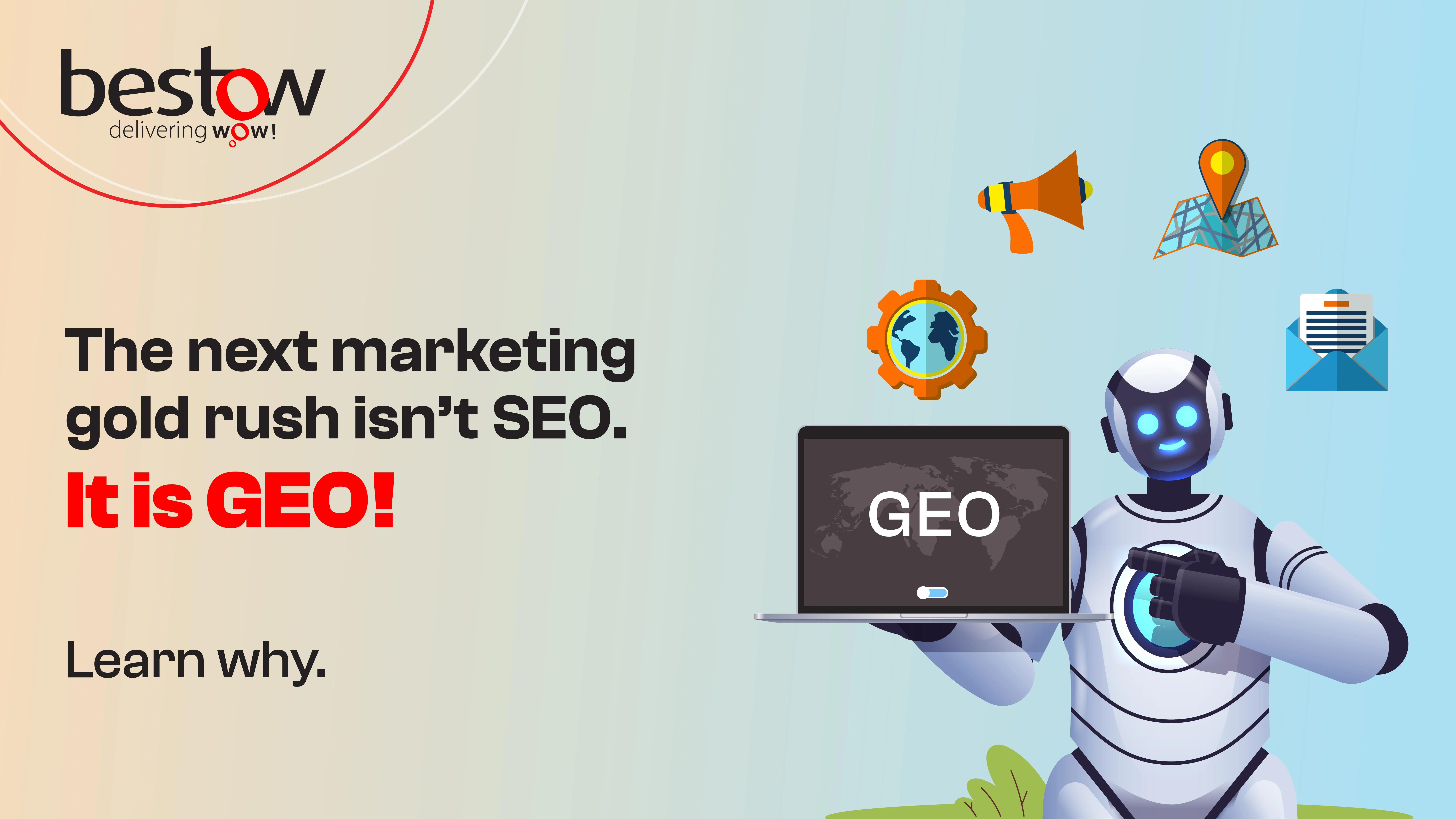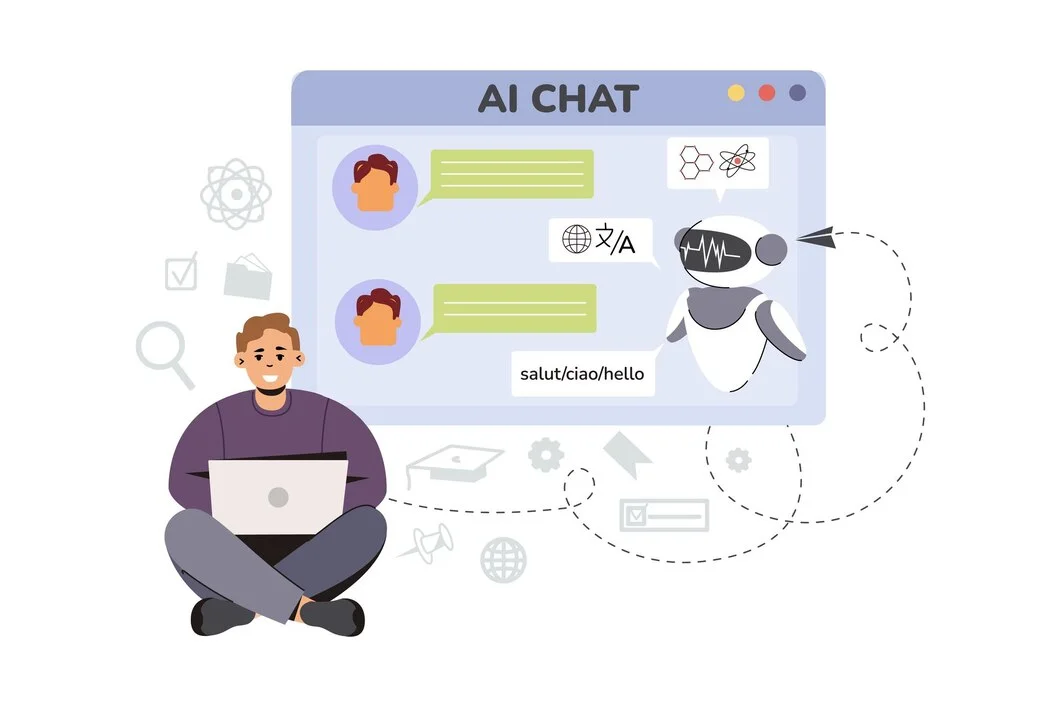Generative Engine Optimization (GEO): GEO is the New SEO.

18/09/2025
Start Listening
Generative Engine Optimization (GEO): GEO is the New SEO.
Have you started searching more on ChatGPT than Google lately? You are not alone. A recent study found that 80% of people now turn to AI summaries for almost half of their searches, showing just how quickly search habits are shifting. So if AI is taking over, does it mean that SEO does not matter anymore? Not really! It just means the way we show up online is evolving.
In this blog, we will be deep diving into GEO marketing, a fairly new concept in the realm of digital marketing. Also, we will discuss the future of SEO with AI. So, whether you are a full-time digital marketer or an emerging entrepreneur, Bestow ensures you will learn something new today. So, take out your notepad, and let’s get started!
Starting With The Basics: What is SEO?
Ruling the digital space for over two decades, we cannot simply ignore SEO. It has helped businesses skyrocket, build loyal customer bases, and stay competitive online. SEO (Search Engine Optimization) is the process of improving your website so it shows up higher when people search for something on Google, Bing, or any other search engine.
Ever wondered how Myntra or Flipkart pop up instantly when you search for "men’s T-shirts" or the "latest sarees"? That’s SEO at work, making sure the right content reaches the right people at the right time. Whether it is a small café down the street or a global e-commerce giant, SEO has been the backbone of digital discovery, ensuring brands don’t just exist online but actually get seen.

Now, Let’s Get Technical: What Is GEO?
If SEO is all about making your website visible on search engines like Google or Bing, GEO (Generative Engine Optimization) takes it a step further. Instead of competing for a place in a long list of search results, GEO is about making sure your content is included in the answers people get directly from AI tools like ChatGPT, Google’s AI Overviews, or Perplexity.
Think of it this way: SEO helps your bakery show up when someone searches for "best chocolate cake near me." GEO, on the other hand, makes sure that when someone asks an AI, “Where can I get the best chocolate cake nearby?” your bakery is mentioned in the response itself. So, GEO is essentially an AI-driven search optimization, where your brand or website is recommended by an AI for any query.
GEO vs. SEO: Who Is Winning?
As we have already mentioned, SEO is all about getting people to click on your website; GEO is about being part of the actual answers people receive from AI. Understanding the differences between the two can help your brand stay visible, relevant, and trusted in both traditional search and the AI-driven world.
Now, let’s break it down in simple, real-world terms.
| Aspect | SEO | GEO |
|---|---|---|
| Purpose & Visibility | Helps your website rank higher on search engines like Google or Bing. Example : Searching “best digital marketing agency in Vadodara” shows top agencies on Google’s first page. |
Ensures your content is included in AI-generated answers. |
| Success Metrics | Measured by clicks, impressions, and ranking positions.
|
Measured by AI mentions, citations, and inclusion in AI responses.
|
| Content Focus | Keywords, meta tags, backlinks, structured content.
|
Clear, factual, trustworthy content AI can reference.
|
| Timeframe | Can take weeks or months to show results.
|
Can happen quickly if content is authoritative.
|
Top Tips for Optimizing Content for ChatGPT and AI Search
If you want your brand to show up in AI-driven answers, you’ll need to tweak the way you create content. It’s less about stuffing in keywords and more about being the “go-to” source AI trusts. Here are some practical tips:
1. Maintain A Consistent Brand Tone
Inconsistent tone weakens trust. Keep messaging uniform so AI represents your brand confidently, as AI pulls from your website, social media, and PR.
Example : Instead of using playful language on Instagram (“Math made fun!”) but formal wording on your website (“We deliver high-quality educational services”), keep it aligned: “We make learning math fun and effective for kids.”
2. Improve Authoritativeness
AI looks for signals that show your brand is credible and trustworthy. Building authority through backlinks, customer reviews, and citations makes your content stronger and more reliable, making your GEO stronger.
Example : “We are a trusted abacus brand,” show proof: “Featured in Education Times and backed by 200+ 5-star parent reviews, UCMAS is a globally trusted abacus program.”
3. Be Crystal Clear and Concise
AI loves content that’s easy to understand. Write in short, direct sentences so your points don’t get lost.
Example : Instead of saying “Our establishment has been consistently recognized as a premier culinary destination,” just say “We’re known as one of the best restaurants in town.”

4. Answer Questions Directly
Think about the exact questions your audience might ask an AI and provide straight answers.
Example : Add a section like, “What is the best age for kids to start abacus learning? – Between 4–13 years.”
5. Use Reliable Sources
AI prefers to cite trustworthy data. Back up your claims with research, stats, or case studies.
Example : If you’re writing about digital marketing, reference studies from reputable sources.
6. Create Factual, Evergreen Content
AI engines value timeless content that remains useful.
Example : A guide on “How to Start Yoga as a Beginner” will stay relevant longer than “Top 10 Yoga Trends of 2025.”
7. Structure Matters
Use headings, bullet points, and short paragraphs. This makes it easier for AI to pick out your answers.
From SEO to GEO: Let Bestow Guide Your Next Big Leap
The digital world is moving fast, from search results to smart AI answers, and your brand can’t afford to be left behind. While SEO still matters, GEO is the future of visibility. It’s not just about ranking on Google anymore; it’s about being the trusted name that AI recommends directly to your audience.
At Bestow, we help you bridge this shift with strategies that make your content both search-friendly and AI-ready. So if you’re ready to move beyond clicks and step into conversations, let Bestow guide your next big leap.
Ready for GEO?
Let’s talk
FAQs
GEO is the process of optimizing content so it gets cited by AI tools like ChatGPT or Google AI Overviews, not just search engines.
SEO boosts rankings on Google with keywords and backlinks, while GEO ensures AI models mention your brand in their answers.
Not exactly. GEO complements SEO. Search engines still matter, but AI is becoming another major way people discover information.
GEO builds trust, gets brands mentioned in AI answers, and helps businesses reach audiences faster than SEO alone.
Yes. As AI-driven search grows, GEO will play a key role in keeping brands visible and credible online.
Categories
Recent Blogs
Send us a message
We'd love to hear from you
Let's build a plateform that works for you busines and the advertisers who trust it.
Talk to Our Expert